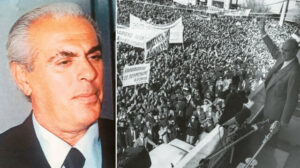They were all gone, except for him. On that afternoon in May, the annual memorial service for Konstantinos Karamanlis had just ended
From Filothei, where the politician rests, and where the eponymous foundation is based, his family and closest former associates had gradually withdrawn. Not him. As he had done every year, Theodore Charitopoulos remained, touched and alone at the back. For 26 consecutive years, he had been present at this service, mourning Karamanlis’ death. He had grieved deeply that Easter in 1998 at Health Hospital. Since then, each year, his mind flooded with memories, he bore the same heavy mourning during the sacred service for the repose of the politician’s soul. Now, in his advanced age but standing erect, he remained austere and silent, making sure everything was perfect. He wondered if the marble headstone was shining and spotless, if the flowers surrounding the grave were thriving, if the flame in the nickel candle was burning bright.
That same evening, Theodore left for the airport to catch his flight to his island. Seven months later, the legendary Theodore Charitopoulos would pass away in his hometown of Mykonos.
A figure of quiet dignity, Theodore had long been known as “Karamanlis’ cook,” a model of traditional values, integrity, and unswerving dedication. Over his 88 years, he departed this world with countless untold stories—behind-the-scenes moments that shaped modern Greek history. He had seen and heard nearly everything in his long years by Karamanlis’ side, yet he remained humbly discreet, never sharing an embarrassing detail or an unflattering anecdote. Though he had been a silent witness to many triumphs and shadows, he remained steadfastly modest, keeping his secrets close.
The Cook’s Son
Mykonos in the 1960s: a windswept, stone-dusted island. Whitewashed houses, narrow alleys, churches, and mills grinding the local grain. At the time, Konstantinos Karamanlis’ true homeland was Macedonia, specifically Serres. But when it came to holidays, the Cycladic island of Mykonos was his haven.
One afternoon, dining at the Lito Hotel on the old harbor’s narrow promenade, Karamanlis was enchanted by the exquisite flavors. He called the cook over to congratulate her and asked if she would move to Athens to take over his household kitchen. She politely declined, suggesting instead that he hire her son, Theodore, who had been a masterful cook since childhood. Intrigued, Karamanlis looked into the matter.
Theodore, then serving in the Navy, was the son of Captain Antonis Haritopoulos, a fisherman who had famously rescued a half-dead pelican in 1955, which became the island’s beloved mascot. Karamanlis invited the young man to his home in Kolonaki, where they sampled his cooking. Karamanlis and his wife, Amalia, were both impressed. Theodore had the skill to transform simple ingredients—herbs, sea salt, sun-dried tomatoes—into culinary masterpieces. But it wasn’t just his culinary talent that impressed them; they appreciated his discipline, honesty, and the sincerity of his character. From that moment, Theodore was in.
Self-Exile
The turbulent political climate forced Karamanlis into self-imposed exile. On December 9, 1963, after his fallout with the monarchy and the palace, Karamanlis, his wife Amalia, and his secretary Ioannis Zacharakis left for Paris under the pseudonym “Triantaphyllides”. Soon after, Theodore arrived to support them.
He was the only one who knew everything about Karamanlis. Theodore handled the household, arranging everything with unwavering discretion. He managed calls, controlled the flow of visitors, and ensured Karamanlis’ needs were met without ever revealing his secrets. Over the 11 years of Karamanlis’ stay in Paris, their relationship deepened. Theodore became more than just a servant; he became his shadow, confidante, and friend.
The Specialties
Theodore’s culinary skills were unparalleled. He delighted in preparing meals for visitors like party officials and intellectuals, ensuring Karamanlis’ friends were well-fed and cared for. But beyond meals, Theodore’s daily duties were far-reaching: he delivered newspapers from Orly Airport, arranged meetings, and tended to Karamanlis’ health and diet. Even during the May 1968 student protests, he remained a steady presence, keeping the household calm and ensuring everything ran smoothly.
Karamanlis, a man of simple tastes, was delighted with Theodore’s meals: the pork shanks, the onion pies, the aromatic garnishes. Theodore also prepared sophisticated Mediterranean dishes for businessmen like Andreas Mentzelopoulos, but Karamanlis remained steadfast in his preference for watered-down whiskey and a modest meal.
Despite being so close, Theodore never pried into Karamanlis’ private life, even when rumors about Karamanlis’ romance with the model Marina Dimitropoulou spread. If anyone asked Theodore for gossip, they might as well have asked the walls. His loyalty was unwavering.
The Return
In 1974, after nearly a decade in Paris, Theodore finally returned to Mykonos for a visit. The invasion of Cyprus and the collapse of the junta delayed his return, but when Karamanlis came back to Greece on July 23-24, Theodore was ready. He secured a boat to Piraeus, carrying all of Karamanlis’ essentials—razor, pajamas, and more. He arrived just as Karamanlis was recovering from a late-night arrival. Theodore quickly got to work, ensuring the Prime Minister’s return was as smooth as possible.
A Steadfast Presence
Throughout Karamanlis’ return to power, Theodore remained his loyal servant, traveling with him on official visits. On one occasion, during a trip to Bulgaria in 1975, Karamanlis was invited to a dinner by Bulgarian leader Todor Zhivkov. After a night of celebration, Theodore discreetly reminded Karamanlis to get some rest for their return to Athens. He had become, in essence, the voice of reason—always looking out for Karamanlis’ well-being.
Even in the later years of Karamanlis’ presidency, Theodore was always by his side, managing the daily affairs of the household. But he never sought official recognition. When suggested he run for office in Mykonos, he declined. “What do you want with that?” Karamanlis asked. “You are with the President of the Republic.”
The Final Years
In his final years, Karamanlis often spent time in Mykonos, staying in the quiet company of Theodore and his family. Even when Karamanlis retired from public life, Theodore continued to care for him, checking on his health and ensuring his meals adhered to his simple, spartan diet. The bond between them never wavered, and Theodore remained a loyal, devoted figure until the very end.
When Theodore passed away in 2005, he left behind a legacy of dignity and unwavering loyalty. He had served not only as Karamanlis’ cook but also as his most trusted confidante—a man who never sought personal gain but gave everything to the man he considered a second father. Their relationship, built on mutual respect and affection, remained a testament to an era of loyalty, integrity, and simplicity that is increasingly rare today.
Ask me anything
Explore related questions





